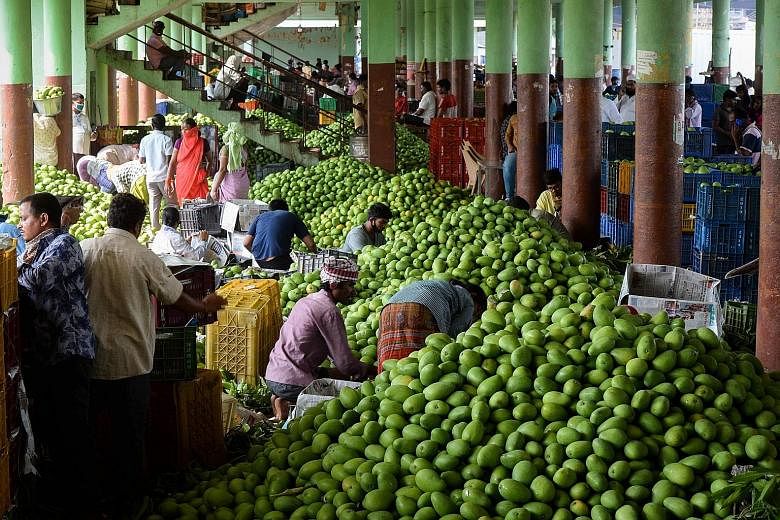Agriculture, the Indian government believes, might be the sector to lead the economy out of the Covid-19 crisis.
The Finance Ministry has pointed to some encouraging signs from the past month. Demand for farm equipment grew in April. The water level in reservoirs is 40 per cent to 60 per cent higher than last year. And millions of migrant labourers in cities are travelling back to their villages, where they will probably work on farms.
"Agriculture alone will give more than 0.52 per cent to the growth rate of Indian economy as markets are intact and prices have not crashed," said Mr Ramesh Chand, a member of the government think-tank Niti Aayog.
Global economic agencies expect India's gross domestic product (GDP) to slow to 1.2 per cent to 2 per cent from 4.1 per cent last year.
But economists say a lot depends on good weather, and how soon the government can pay cash-strapped farmers.
As India emerges from its two-month-long lockdown, Finance Minister Nirmala Sitharaman announced an economic revival package of 20 trillion rupees (S$375 billion) and regulatory changes in eight sectors.
The biggest reforms target agriculture, which employs over half of the country's workforce. As instant relief, Mrs Sitharaman said the government would transfer insurance payouts and credit pending to 90 million farmers. It will vaccinate farm animals at a cost of 13 billion rupees, and spend 20 billion rupees on developing fisheries.
Much of this was familiar to analysts. Mrs Sitharaman had simply tweaked current farm subsidies and relaunched some ongoing programmes, without addressing concerns like lack of income, food insecurity, labour crisis or transportation hitches. This week, a locust infestation also ruined standing crops in west India.
Food trade policy analyst Devender Sharma said cash handouts or basic income for farm workers could help them buy food, pay rent and invest in their land.
The key proposals for the farm sector rest in three reforms to ease logjams in selling farm produce. Economist Ashok Gulati, who has backed these reforms, said announcing them was a way to "convert a crisis into an opportunity."
-
17%
Agriculture's contribution to India's GDP.
55%
Population employed in agriculture.
SOURCES: ECONOMIC SURVEY 2018-19, MINISTRY OF AGRICULTURE
First, the government modified a scarcity-era law from 1955 that regulates the sale and prices of essential commodities. It deregulated cereals, edible oils, oil seeds, pulses, onions and potatoes.
Second, it will relax state control on agriculture marketing, and third, push through contract farming. State-run wholesale markets, where licensed traders buy produce from farmers at regulated prices in auctions, will be gone. Set up to get farmers a fair price and safeguard them from exploitation by middlemen, the markets have become corrupt and inadequate over the decades.
With upcoming laws, retail markets, manufacturers or even communities could buy directly from farmers, or get produce grown on contract at larger scales than now allowed in India. Farmers can do inter-state sales and e-trade their produce directly to the highest payer.
Economists, while welcoming the reforms, say their impact is unclear. Only about 40 per cent of farm produce is bought and sold in regulated markets, so the reforms only target a small section of farmers. Also, some states have already tried to deregulate markets, with varying success.
"Abolishing markets is okay. But the success depends on what you replace it with. The government is ambiguous about that," said agricultural economist Himanshu, who goes by one name. Also, without curbing price spikes, food might even become more expensive for consumers, he said.
Farmers' groups have opposed price deregulation and contract farming, fearing exploitation. They say the reforms will not uproot trader cartels, or give farmers bargaining power - the core problems with the state-run markets.
Mr Himanshu said the new open system must prevent monopolistic buyers from cornering the market.
For farming to grow, farmers need to access better prices, Mr Sharma said. He suggested not removing wholesale markets but supplementing them with many more, closer to the farms.

